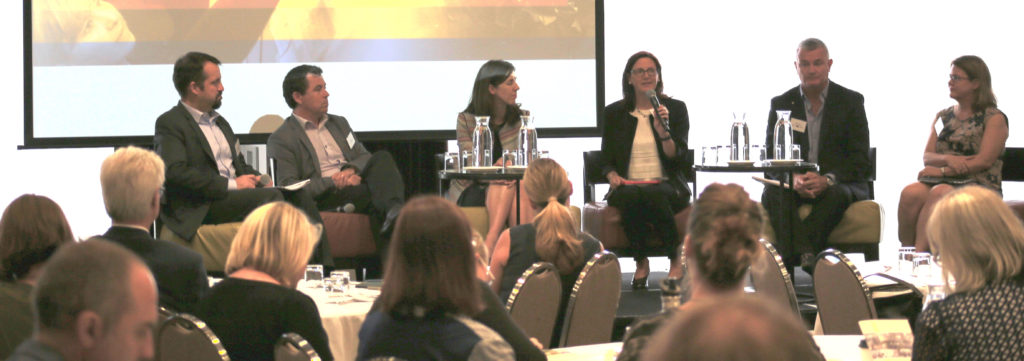The Shared Value Project recently held a shared value government forum in partnership with DFAT and NAB in Canberra on 1 February 2017 exploring the role of ‘Government as a Catalyst for Shared Value Partnerships’. Shared Value Project Deputy Chair and Founder Rhod Ellis-Jones reflects on the case for shared value in government, and the many other forces that compel government to consider shared value as a framework for engaging the corporate and social sectors, and also consumers.
Just over five years since the shared value concept was published in the Harvard Business Review, and after a significant wave of interest and initial implementation by the corporate sector, it is the right time to be talking about shared value in government.
Government provides incentives for the private sector to consider addressing social issues through levers such as regulatory reform and tax relief. But, beyond an enabling ‘tool’, shared value can also assist government to understand and redefine its role and positively influence its diverse audiences.
To build on yesterday’s animated discussion, let’s look at the context and the opportunity.
Context
There are many other forces that compel government to consider shared value as a framework for engaging the corporate and social sectors, and also consumers. Here are a few we are feeling in Australia at the beginning of 2017:
- Trust in politicians is at an all-time low, but trust in companies is rising.
- Shifting roles as business enters service markets that once were dominated by government and charitable organisations.
- Deregulation and/or reform of insurance, health, aged care, disability and other sectors or markets.
- Shrinking revenue and rising costs.
- Big data, much of it not on government servers but fundamental to responsive and accurate policy making.
- Rapid change in technology development, markets, community expectations and, increasingly, climate.
Opportunity
So, what is the case for shared value in government?
Shared value focuses companies and consumers on value – and the relative cost of its creation. As governments look to the private sector to create value, they must also empower consumers to express their social needs/values and exercise them in their choice of product or service.
Reform is impossible unless consensus among all or most parties can be gained. As society and markets rapidly change, so too must the reform and evolution of policy. Shared value unites partners/stakeholders with a definition and pursuit of shared purpose. Vested interest is painfully obvious and runs counter to the innovation agenda framed by shared value.
As our government and its suppliers of services become more agile, how do we ensure the social needs and expectations of all Australians are not overlooked? Shared value marries well with contemporary services, systems, and product design methods.
Shared value facilitates the development of new markets and the changing roles of organisations and sectors in those markets as a framework for co-design, collaboration and shared outcome setting.
Consumers want convenient, immediate access to services as their needs, new opportunities, and enabling technologies emerge. But we don’t want people left behind, creating costs for society down the line. Shared value helps government guide market development, focusing companies and social sector organisations on the social impact of change – including the risks.
Governments are already at the table, creating innovative financial solutions to fund social and health interventions in the form of social impact bonds. Shared value can frame the identification and assessment of new opportunities.
One of the earliest hurdles for champions within companies who seek to develop a shared value initiative is funding for the business case: commissioning the necessary research and modeling, and assigning employee time. Government can provide the necessary incentives to catalyse business case development and investment at that early, low-cost and critical stage.
The promise of deregulation is competition and innovation leading to lower consumer prices and better solutions. That’s more value for the taxpayer dollar as government revenue can be spent where it can have the greatest impact. Shared value facilitates deregulation and needs identification.
Ellis Jones’ experience on multi-partner initiatives focused on improving health is that a shared value approach brings partners together establishing the necessary trust to share data, challenges, and successes. Beyond better and more responsive decision-making, this also leads to identification of new impacts to address and new opportunities for innovation or market development.
Australians want more choice and better services at lower cost. But they also want to ensure the integrity of citizenship, and the protections citizenship affords, is not lost.
This is the future of Australian government: ensuring no Australian lives without a pathway out of poverty, illness or social disadvantage while reducing its service delivery role. Right now, it is stepping carefully to change entrenched perceptions of itself as a service provider while guiding and regulating private sector entry and markets.
As a concept, and with its proven frameworks, there are obvious advantages for applying shared value in government.
This article was originally published via Ellis-Jones
